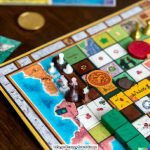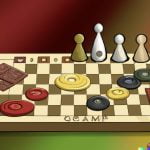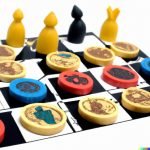Are you looking for the best 2 player board games strategy? As the popularity of 2-player board games continues to soar, more and more gamers are seeking out strategic gaming experiences that cater specifically to two players. In this article, we will explore the rise in popularity of 2-player board games and delve into the appeal of strategic gameplay for duos.
In recent years, there has been a noticeable surge in the popularity of 2-player board games. This trend can be attributed to various factors, including the convenience of only needing one opponent to play, as well as the intimate and competitive nature of two-player gaming experiences. With a focus on close competition and deep strategic gameplay, these types of board games offer a unique appeal that caters specifically to pairs of players.
For many gaming enthusiasts, 2-player board games are an ideal way to engage in intense and cerebral gaming experiences without the need for large groups or complex rulesets. The allure of strategic thinking in a head-to-head battle against a single opponent is undeniable, making these types of board games highly sought after among those who enjoy immersive and mentally stimulating gameplay.
Top 5 Best 2 Player Board Games
When it comes to 2-player board games, the choices seem almost endless. For those who enjoy a challenge and strategic gameplay, there are several standout options that consistently receive high praise from both critics and players. The following are the top 5 best 2-player board games that offer a compelling mix of strategic depth, replay value, and overall enjoyment for two players.
Chess
Widely regarded as one of the most popular and enduring 2-player board games of all time, Chess is a game of pure strategy and skill. With its simple yet elegant rules, Chess offers endless possibilities for strategic gameplay, requiring players to plan several moves ahead while adapting to their opponent’s tactics. Its combination of tactical maneuvering and long-term planning makes it a timeless classic that continues to captivate players around the world.
War of the Ring
Based on J.R.R. Tolkien’s iconic fantasy world, War of the Ring is an epic strategy game that allows two players to immerse themselves in the War of the Ring storyline.
With its asymmetrical gameplay where one player takes on the role of the Free Peoples while the other controls the Shadow Armies, War of the Ring offers rich thematic immersion combined with deep strategic decision-making. Players must carefully manage their forces, navigate political alliances, and outmaneuver their opponent in a quest to either conquer or preserve Middle-earth.
Twilight Struggle
Set during the Cold War era, Twilight Struggle places players in control of either the United States or Soviet Union as they compete for global dominance through political influence and military might. This intense tug-of-war between superpowers requires careful consideration of card play, managing resources, and understanding historical events to develop winning strategies. Twilight Struggle’s intricate gameplay and historical context provide a compelling experience for those seeking a deeply strategic 2-player board game.
These top 5 best 2-player board games offer engaging gameplay experiences that blend strategic thinking with thematic immersion. Whether you prefer classical games like Chess or immersive strategy games set in rich fictional worlds like War of the Ring and Twilight Struggle, these titles provide excellent options for honing your strategic skills in head-to-head matchups with a friend or family member.
Understanding Strategy in 2 Player Board Games
When it comes to 2-player board games, having a solid strategy can make all the difference between winning and losing. Understanding the different types of strategies involved in playing these games is crucial for anyone looking to up their game and increase their chances of victory. Whether it’s long-term planning, adaptability, or tactical decision-making, a good strategy can set you apart as a formidable opponent.
Long-Term Planning
Long-term planning is an essential aspect of strategic gameplay in 2-player board games. It involves thinking several steps ahead and considering how your current actions will impact future moves. One important aspect of long-term planning is resource management – making sure you have enough resources to sustain your strategy over the course of the game. Additionally, anticipating your opponent’s potential moves and building a plan that can counter them effectively falls under long-term planning.
Adaptability
Another key element of strategy in 2-player board games is adaptability. This involves being able to change your approach or tactics depending on how the game unfolds. Being too rigid in your strategy can leave you vulnerable to unexpected moves from your opponent. It’s important to be able to adjust and refine your strategy based on changes in the game state and your opponent’s actions.
Tactical Decision-Making
Tactical decision-making focuses on short-term actions that are aimed at gaining an immediate advantage or countering an opponent’s move. This can involve analyzing specific situations on the board and making decisions that will directly impact the outcome of the game in the near future. It requires quick thinking, evaluating multiple options, and weighing potential risks against potential rewards.
Understanding these different types of strategies involved in playing 2-player board games will give you a strong foundation for improving your gameplay skills and becoming a more competitive player. By mastering long-term planning, adaptability, and tactical decision-making, you will be better equipped to tackle any game that comes your way with confidence.
Tips for Mastering 2 Player Board Game Strategy
Playing 2-player board games often requires a combination of skill, planning, and a keen understanding of strategy. To win at these types of games, players need to be able to anticipate their opponents’ moves, maximize their resources, and prioritize their objectives effectively. In this section, we will discuss some practical advice for improving strategic gameplay in 2-player board games.
One of the best 2 player board games strategy tips is to understand the game mechanics thoroughly. This involves knowing the rules, understanding the objectives, and being aware of all possible moves and strategies available within the game. By having an in-depth understanding of how the game works, players can make more informed decisions that align with their goals and anticipated moves from their opponent.
Maximizing your resources is another important aspect of mastering 2-player board game strategy. Whether it’s currency, units, or cards, utilizing your resources efficiently can give you a competitive advantage over your opponent. A strategic approach to resource management can help you secure key positions on the board or maintain control over important components that contribute to your overall success in the game.
Prioritizing your objectives is crucial when developing a winning strategy in 2-player board games. It’s essential to have a clear understanding of what you need to accomplish in order to secure victory.
Players should focus on short-term goals that align with their long-term objectives while remaining adaptable enough to adjust their strategies based on changing circumstances throughout the game. By properly prioritizing objectives, players can stay ahead of their opponents and maintain control over the direction of gameplay.
| Board Game Strategy Tip | Description |
|---|---|
| Understand Game Mechanics | Knowing the rules and mechanics of a game leads to better decision making. |
| Maximize Resources | Utilize resources efficiently to gain an advantage over your opponent. |
| Prioritize Objectives | Focusing on short-term goals aligned with long-term objectives maximizes chances for success. |
Popular Strategies for Specific Board Games
The best 2 player board games strategy should be carefully considered in order to ensure an enjoyable experience and maximize your chances of winning. Some popular 2-player board games that require a strong strategic approach are Chess, War of the Ring, and Twilight Struggle.
In Chess, players must plan their moves several steps ahead and anticipate their opponent’s responses. The game requires a mix of offensive and defensive strategies, as well as controlling the center of the board to gain an advantage.
War of the Ring is a complex war-themed board game that involves players taking on the roles of either the Free Peoples or the Shadow Armies. The key to success in War of the Ring lies in long-term planning and resource management. Players must consider their armies’ movements strategically and leverage their powers and abilities effectively to overcome their opponent.
Twilight Struggle is a two-player game set against the historical backdrop of the Cold War. It involves political influence, military operations, and espionage. Effectively managing regional control and timing your opponent’s actions can give players a significant advantage in this strategic game.
Overall, these popular 2-player board games require careful planning, adaptability, and tactical decision-making to succeed. Understanding each game’s unique mechanics and mastering various strategic approaches can significantly improve your chances of coming out on top.
| Board Game | Main Strategy |
|---|---|
| Chess | A mix of offensive and defensive strategies, long-term planning |
| War of the Ring | Long-term planning, resource management, leveraging powers |
| Twilight Struggle | Military operations, regional control, timing your opponent’s actions |
The Importance of Communication and Mind Games
When it comes to 2-player board games, communication and psychological tactics play a crucial role in determining the outcome of the game. Effective communication with your opponent can help in understanding their thought process, predicting their moves, and ultimately making strategic decisions. Furthermore, mind games such as bluffing and misdirection can add an exciting layer of complexity to the gameplay, requiring players to be one step ahead of their opponents.
To make the most out of communication and mind games in 2-player board games, here are some tips for players looking to improve their strategic decision-making:
- Pay attention to non-verbal cues: Sometimes, your opponent’s body language or facial expressions can give away their intentions. Observing these non-verbal cues can provide valuable insights into their next move.
- Master the art of bluffing: Whether it’s through feigning confidence or misrepresenting your strategy, a well-executed bluff can catch your opponent off guard and give you a significant advantage.
- Practice active listening: Engage in meaningful conversations with your opponent during the game while also paying attention to subtle hints they might drop about their plans or thought process.
In addition to communication and mind games, understanding your opponent’s psychology is also key to making informed strategic decisions during 2-player board games. By analyzing your opponent’s behavior, preferences, and typical gameplay style, you can adapt your strategy accordingly and gain a competitive edge.
Remember that mastering communication and psychological tactics in 2-player board games takes time and practice. However, incorporating these elements into your gameplay can elevate the overall experience and lead to more engaging and rewarding gaming sessions.
Advanced Strategy Techniques
When it comes to mastering the best 2 player board games strategy, players often need to go beyond the basics and embrace more advanced techniques. One such technique is bluffing, which involves intentionally misleading your opponent about the strength of your position or your intended moves.
In games like Stratego or Poker, bluffing can be a powerful tool for gaining an advantage or forcing your opponent into making a mistake. Additionally, misdirection tactics can also be effective in creating confusion and uncertainty in your opponent’s mind, giving you an edge in games that require strategic planning.
Another crucial aspect of advanced strategy in 2-player board games is multi-step planning. This involves thinking several moves ahead and anticipating different possible scenarios based on your actions and those of your opponent.
Games like Chess or Go require players to think not just about their next move, but also about how it will impact the subsequent turns. By developing multi-step plans that account for various outcomes, you can increase the chances of achieving your long-term goals and outmaneuvering your opponent.
It’s important to note that these advanced techniques should be used with caution and consideration of the specific game rules and dynamics. While bluffing can be a potent weapon in some situations, overusing it or using it at the wrong time may backfire and undermine your overall strategy. Similarly, multi-step planning requires a deep understanding of the game mechanics and potential outcomes, as well as an ability to adapt quickly if things don’t go according to plan.
Overall, incorporating these advanced strategic techniques into your 2-player board gaming repertoire can elevate your gameplay experience and give you a competitive edge against skilled opponents who are also seeking mastery.
Conclusion
In conclusion, the world of 2-player board games offers a rich and fulfilling experience for those who enjoy strategic gameplay. From classic games like Chess to modern favorites such as War of the Ring and Twilight Struggle, there are countless opportunities for players to engage in intense and satisfying battles of wits.
By understanding the different types of strategies involved in 2-player board games and learning practical tips for mastering these strategies, players can elevate their gaming experiences to new heights.
It’s important to remember that successful strategy in 2-player board games often requires a combination of long-term planning, adaptability, and tactical decision-making. Anticipating your opponent’s moves, maximizing your resources, and prioritizing your objectives are all essential aspects of becoming a skilled player. Additionally, effective communication and psychological tactics can play a significant role in outmaneuvering your opponent.
As you continue your journey into the world of 2-player board games, don’t be afraid to explore advanced strategy techniques such as bluffing, misdirection, and multi-step planning. These techniques can add an extra layer of depth to your gameplay and challenge you to think in new ways.
Ultimately, the best 2-player board games strategy is one that allows for creativity, adaptability, and thoughtful decision-making. So embrace the challenge, hone your skills, and enjoy the thrill of strategic gaming with a worthy opponent.
Frequently Asked Questions
What Are the Best Strategic Board Games?
The best strategic board games are often those that require players to think ahead, make calculated decisions, and adapt to changing circumstances. Games like Settlers of Catan, Risk, and Chess are considered some of the best in this category.
What Is a Good Board Game for 2?
When it comes to finding a good board game for two players, options like Patchwork, 7 Wonders Duel, and Jaipur are popular choices. These games are specifically designed for two players and offer engaging gameplay without needing a larger group.
Which Game Is Best for Two Players?
Finding the best game for two players can depend on personal preferences, but highly-rated options include Codenames Duet, Twilight Struggle, and Pandemic. These games offer immersive experiences designed for two players to enjoy together while challenging each other strategically.

I love playing all kinds of games – from classics like Monopoly to modern favourites like Ticket to Ride.
I created this blog as a way to share my love of board games with others, and provide information on the latest releases and news in the industry.





